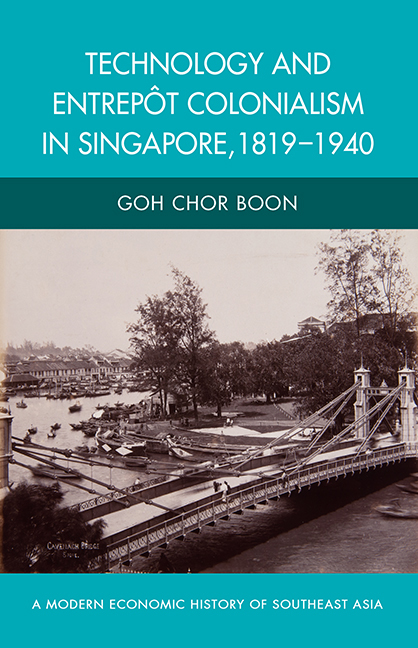Book contents
- Frontmatter
- Contents
- List of Figures and Tables
- Notes on Currency
- Introduction
- 1 Technology and the British Empire
- 2 Pioneers of Change: Entrepreneurs and Engineers
- 3 Maritime Technology and Development of the Port
- 4 Introducing Technological Systems
- 5 Sanitation and Public Health
- 6 Agriculture and Colonial Science
- 7 Food and Singapore Cold Storage
- 8 Politics of Imperial Education
- 9 Technology Transfer and Limited Industrial Growth
- Conclusion
- Bibliography
- Index
1 - Technology and the British Empire
Published online by Cambridge University Press: 21 October 2015
- Frontmatter
- Contents
- List of Figures and Tables
- Notes on Currency
- Introduction
- 1 Technology and the British Empire
- 2 Pioneers of Change: Entrepreneurs and Engineers
- 3 Maritime Technology and Development of the Port
- 4 Introducing Technological Systems
- 5 Sanitation and Public Health
- 6 Agriculture and Colonial Science
- 7 Food and Singapore Cold Storage
- 8 Politics of Imperial Education
- 9 Technology Transfer and Limited Industrial Growth
- Conclusion
- Bibliography
- Index
Summary
The Industrial Revolution took place in Great Britain at about the 1760s, and by the 1850s Britain was crowned “the workshop of the world”. To celebrate, Queen Victoria opened “The Great Exhibition” at Crystal Palace on 1 May 1851. It was opened to all nations — including the “uncivilized” nations — and the main purpose was the display of Britain's industrial achievements. The Times reported on 2 May 1851 that it was “a sight the like of which has never happened before, and which … can never be repeated…”. The Queen herself recorded in her journal:
What used to be done by hand and used to take months doing is now accomplished in a few instants by the most beautiful machinery. We saw first the cotton machines from Oldham… We saw hydraulic machines, pumps, filtering machines of all kinds, machines for purifying sugar — in fact, every conceivable invention. We likewise saw medals made by machinery which not more than fifteen years ago were made by hand, fifty million instead of million can be supplied in a week now.
The Industrial Revolution was a period blessed with technological triumphs that did not draw upon theoretical knowledge. Many of the machines invented had little to do with the science of the day. The rise of the textile industry, which accounted much for the economic growth of eighteenth century Britain, was not the result of the application of scientific theory. The inventions of John Kay, James Hargreaves, Richard Arkwright and Samuel Crompton were essentially owed more to past craft practices than they did to science. They were the outcome of evolutionary changes within technology. The arrival of modern science only began to make its mark from the latter half of the nineteenth century. The Great Exhibition of 1851, and similar ones that followed, glorified industrial progress and the men who made it possible. More significantly, they were also used to measure the relative industrial growth of nations. The accelerating changes brought about by the machines, and the steam engines that powered them were truly revolutionary in the ways they affected the lives and fortunes of the people of Great Britain. Technology became a factor in international affairs and conflicts.
- Type
- Chapter
- Information
- Publisher: ISEAS–Yusof Ishak InstitutePrint publication year: 2013



